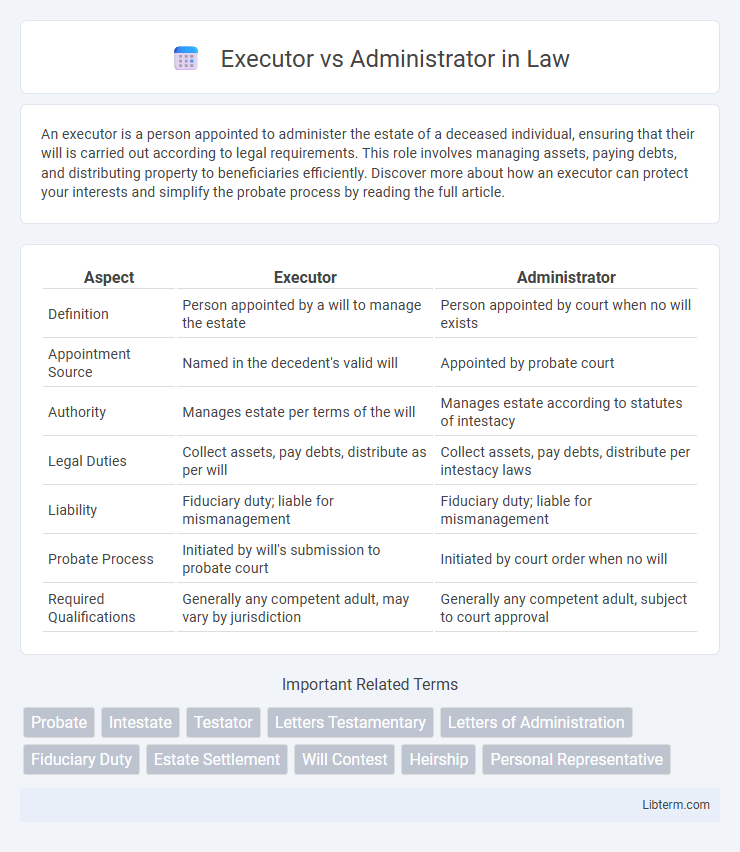An executor is a person appointed to administer the estate of a deceased individual, ensuring that their will is carried out according to legal requirements. This role involves managing assets, paying debts, and distributing property to beneficiaries efficiently. Discover more about how an executor can protect your interests and simplify the probate process by reading the full article.
Table of Comparison
| Aspect | Executor | Administrator |
|---|---|---|
| Definition | Person appointed by a will to manage the estate | Person appointed by court when no will exists |
| Appointment Source | Named in the decedent's valid will | Appointed by probate court |
| Authority | Manages estate per terms of the will | Manages estate according to statutes of intestacy |
| Legal Duties | Collect assets, pay debts, distribute as per will | Collect assets, pay debts, distribute per intestacy laws |
| Liability | Fiduciary duty; liable for mismanagement | Fiduciary duty; liable for mismanagement |
| Probate Process | Initiated by will's submission to probate court | Initiated by court order when no will |
| Required Qualifications | Generally any competent adult, may vary by jurisdiction | Generally any competent adult, subject to court approval |
Executor vs Administrator: Key Definitions
An executor is a person named in a will who manages the deceased's estate according to the will's instructions, while an administrator is appointed by the court when no will exists to oversee estate distribution. Executors have legal authority granted by the testator, ensuring the will's directives are executed faithfully. Administrators, often next of kin, follow state laws to settle debts and distribute assets fairly in the absence of a will.
Roles and Responsibilities Compared
Executors are appointed through a will to manage and distribute assets according to the deceased's instructions, while administrators are court-appointed when no will exists. Executors gather assets, pay debts and taxes, and ensure lawful distribution, whereas administrators perform similar duties under court supervision to settle intestate estates. Both roles require fiduciary responsibility, but executors generally have more autonomy and clearer directives than administrators.
Appointment Process: Executor vs Administrator
An executor is appointed through a will explicitly naming them by the deceased, ensuring a smoother and often faster probate process. An administrator is assigned by the court when no valid will exists, or the will does not name an executor, requiring a formal application and court approval. The appointment process for administrators involves more legal oversight to confirm eligibility, whereas executors generally proceed with probate upon submitting the will.
Legal Authority and Powers
An executor is appointed according to the decedent's will to manage and distribute the estate, possessing legal authority granted by the will and probate court. An administrator is appointed by the court when there is no valid will, with powers similar to an executor but subject to stricter court oversight. Both roles involve fiduciary duties, including collecting assets, paying debts, and distributing the estate, but the scope of their legal authority depends on the presence or absence of a testamentary document.
Qualifications and Eligibility
Executors must be named in a valid will and typically be an adult of sound mind, with many jurisdictions requiring they not have a felony conviction or be insolvent. Administrators are appointed by the court when no will exists and must meet similar qualifications, including legal adulthood and absence of conflicts of interest or criminal background. Both roles often require individuals to be competent, legally responsible, and capable of managing estate affairs according to state probate laws.
Handling Assets and Debts
Executors manage assets and debts according to the will, ensuring debts are paid from the estate before distributing assets to beneficiaries. Administrators handle estate assets and liabilities when there is no valid will, following state laws to settle debts and distribute remaining property. Both roles require inventorying assets, notifying creditors, and paying debts to protect the estate and beneficiaries' interests.
Reporting and Accountability
Executors are legally appointed through a will to manage and report on estate affairs, providing detailed probate inventory and final accounting to the probate court. Administrators, appointed by the court when no will exists, handle estate management with similar reporting duties but may face stricter court oversight due to the absence of testator instructions. Both roles require transparent record-keeping, timely filing of financial reports, and adherence to fiduciary responsibilities to ensure accountability to beneficiaries and the court.
Challenges and Common Disputes
Executors often face challenges related to fulfilling the decedent's explicit wishes as outlined in a will, while administrators must navigate the complexities of intestate succession laws without such guidance. Common disputes include conflicts over asset distribution, creditor claims, and delays in probate proceedings that prolong estate settlement. Miscommunication among beneficiaries and potential allegations of mismanagement frequently complicate both roles, requiring thorough documentation and legal acumen.
Succession Laws: Will vs Intestacy
An executor is appointed through a valid will to manage estate distribution according to the testator's wishes, while an administrator is court-appointed when no will exists, handling succession under intestacy laws. Succession laws dictate that an executor has authority based on the decedent's written directives, whereas an administrator follows statutory guidelines to distribute assets among heirs. Understanding the legal distinctions ensures proper estate management aligned with either testamentary instructions or legal defaults.
Choosing the Right Personal Representative
Choosing the right personal representative depends on whether the deceased left a valid will; an executor is appointed by the will to manage estate distribution, while an administrator is court-appointed when no will exists. Executors typically have more authority and can act immediately, whereas administrators may face more court supervision and delays. Understanding state probate laws and the complexity of the estate helps determine the most effective choice between an executor and an administrator.
Executor Infographic

 libterm.com
libterm.com